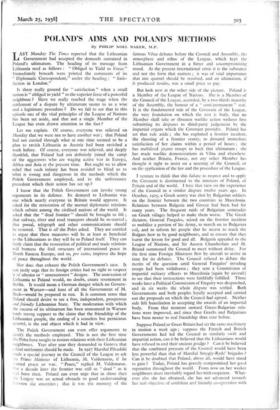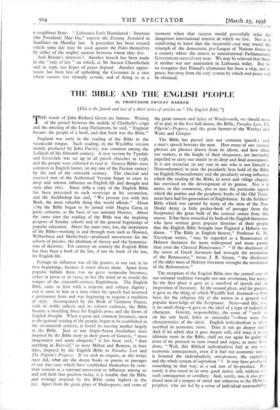POLAND'S AIMS AND POLAND'S METHODS
By PHILIP NOEL BAKER, M.P.
LAST Monday The Times reported that the Lithuanian Government had accepted the demands contained in Poland's ultimatum. The heading of its message from Lithuania read as follows : " Obliged to Yield to Force." Immediately beneath were printed the comments of its " Diplomatic Correspondent," under the heading : " Satis- faction in London."
Is there really ground for " satisfaction " when a small nation is " obliged to yield " to the superior force of a powerful neighbour ? Have we really reached the stage when the settlement of a dispute by ultimatum seems to us a wise and a legitimate procedure ? Do we fail to see that in this episode one of the vital principles of the League of Nations has been set aside, and that not a single Member of the League has even drawn attention to the fact ?
Let me explain. Of course, everyone was relieved on Monday that we were not to have another war ; that Poland had not carried through what at one time seemed to be a plan to ravish Lithuania as Austria had been ravished a week before. Of course, everyone was relieved, and deeply thankful, that Poland had not definitely joined the camp of the aggressors who are waging active war in Europe, Africa and Asia at the present time. But ought we to allow relief that such infamy has been avoided to blind us to what is wrong, and dangerous in the methods which the Polish Government employed, and to the unfortunate precedent which their action has set up ?
I know that the Polish Government can invoke strong arguments in its defence. Its demand to Lithuania was one which nearly everyone in Britain would approve. It asked for the restoration of the normal diplomatic relations which subsist among the civilised nations of the world. It asked that the " dead frontier " should be brought to life ; that railway, river and road transport should be re-started ; that postal, telegraph and other communications should be restored. That is all the Poles asked. They are entitled to argue that these measures will be at least as beneficial to the Lithuanians as they will be to Poland itself. They can fairly claim that the restoration of political and trade relations will buttress the frail structure of international peace in North Eastern Europe, and so, pro twit°, improve the hope of peace throughout the world.
Nor does that exhaust the Polish Government's case. It can justly urge that its foreign critics had no right to suspect it of ulterior or " annexationist " designs. The annexation of Lithuania to Poland would, no doubt, create resentment in Berlin. It would mean a German danger which no Govern- ment in Warsaw—and least of all the Government of M. Beck—would be prepared to run. It is common sense that Poland should desire to see a free, independent, prosperous and friendly Lithuanian State. The moderation with which the success of its ultimatum has been announced in Warsaw lends strong support to the claim that the friendship of the Lithuanian people, the ending of a senseless but pernicious quarrel, is the real object which it had in view.
The Polish Government can even offer arguments to Justify the methods employed. This is not the first time the Poles have sought to restore relations with their Lithuanian neighbours. Year after year they demanded in Geneva that a final settlement should be made. In 1927 Marshal Pilsudski :nade a special journey to the Council of the League to ask -,he Prime Minister of Lithuania, M. Valdemaras, if he wanted peace or war. " Peace," replied M. Valdemaras. But a decade later the frontier was still as " dead " as it ad been then. Poland can even urge that in those days he League was an actual obstacle to good understanding b.:tween the countries ; that it was the memory of the famous Vilna debates before the Council and Assembly, the atmosphere and ethos of the League, which kept the Lithuanian Government in a bitter and uncompromising mood. At the present international crisis it is the substance and not the form that matters ; it was of vital importance that one quarrel should be resolved, and an ultimatum, if it produced results, was a small price to pay.
But look now at the other side of the picture. Poland is a Member of the League of Nations. She is a Member of the Council of the League, accorded, by a two-thirds majority of the Assembly, the honour of a " semi-permanent " seat. It is the fundamental rule of the Covenant of the League, the very foundation on which the rest is built, that no Member shall take or threaten warlike action without first submitting its disputes to third-party judgement by the impartial organs which the Covenant provides. Poland has set that rule aside ; she has exploited a frontier incident, the shooting of a frontier sentry, to demand immediate satisfaction of her claims within a period of hours ; she has mobilised 50,000 troops to back that ultimatum ; she has made warlike demonstrations in Vilna and elsewhere. And neither Britain, France, nor any other Member has thought it right to insist on a meeting of the Council, or on the application of the law and the procedure of the League.
I venture to think that this failure to respect and to apply the Covenant is detrimental to the interests of Poland, of Britain and of the world. I base that view on the experience of the Council in a similar dispute twelve years ago. In October, 1925, a Greek sentry was shot by Bulgarian soldiers on the frontier between the two countries in Macedonia. Relations between Bulgaria and Greece had been bad for many years. The frequent raids of Bulgarian comitadjis on Greek villages helped to make them worse. The Greek dictator, General Pangalos, seized on the frontier incident to mobilise a portion of his Army, to march on to Bulgarian soil, and to inform his people that he meant to teach the Bulgars how to be good neighbours, and to ensure that they learnt the lesson for good and all. Bulgaria appealed to the League of Nations, and Sir Austen Chamberlain and M. Briand summoned the Council to meet without delay. For the first time Foreign Ministers flew by aircraft to arrive in time for its debates. The Council refused to debate the merits of the question until General Pangalos' invading troops had been withdrawn ; they sent a Commission of impartial military officers to Macedonia (again by aircraft) to see that their instructions were faithfully fulfilled. Three weeks later a Political Commission of Enquiry was despatched, and in six weeks the whole dispute was settled. Both Governments and both peoples loyally accepted and carried out the proposals on which the Council had agreed. Neither side felt humiliation in accepting the awards of an impartial body. From that moment onward Greco-Bulgarian rela- tions were improved, and since then Greeks and Bulgarians have been nearer to real friendship than ever before.
Suppose Poland or Great Britain had set the same machinery in motion a week ago ; suppose the French and British Governments had led the Council in similarly swift and impartial action, can it be believed that the Lithuanians would have refused to end their ancient grudge ? Can it be believed that the combined pressure of the Council would have been less powerful than that of Marshal Smygly-Rydz' brigades ? Can it be doubted that Poland, above all, would have stood to gain ? Today, Poland has gravely compromised her good reputation throughout the world. From now on her weaker neighbours must inevitably regard her with suspicion. What- ever else she has obtained, she has not advanced towards her real objective of confident and friendly co-operation with a neighbour State. " Lithuania Feels Humiliated : Smetona (the President) May Go," reports the Evening Standard in headlines on Monday last. A precedent has been created which some day may be used against the Poles themselves by either of the mighty nations between whom they live.
And Britain's interests ? Another breach has been made in the " rule of law " on which, as Sir Austen Chamberlain said in 1936, our hopes of peace depend. Another oppor- tunity has been lost of upholding the Covenant in a case where success was virtually certain, and of doing so at a moment when that success would powerfully relax the dangerous international tension in which we live. Nor is it comforting to know that the successful coup may retard the triumph of the democratic pro-League of Nations forces in a country where the return to constitutional Parliamentary Government seemed very near. We may be relieved that there is neither war nor annexation in Lithuania today. But let us recognise that Poland's ultimatum has been a step, not to peace, but away from the only system by which real peace will be obtained.











































































 Previous page
Previous page